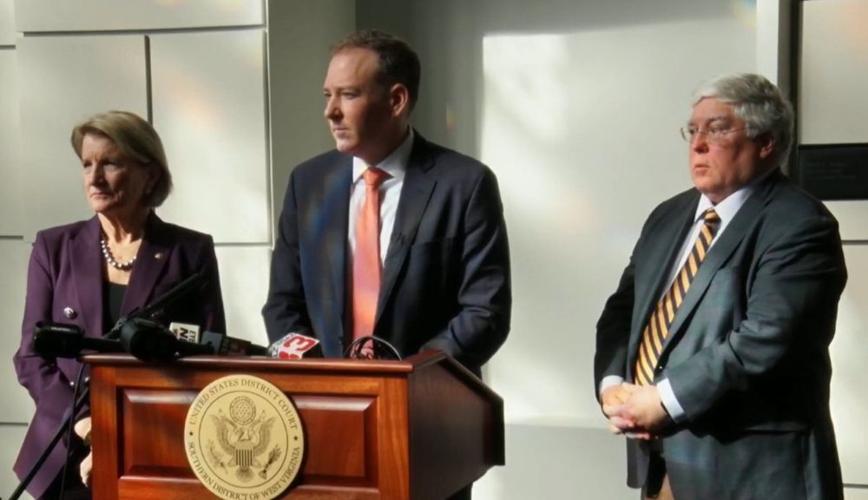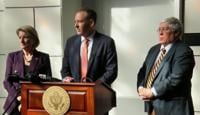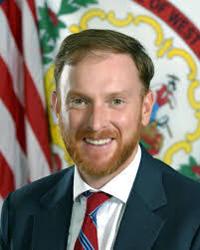
EPA Administrator Lee Zeldin (center) speaks last week in Charleston as U.S. Senator Shelley Moore Capito and Gov. Patrick Morrisey listen.
WASHINGTON — West Virginia officials are praising a proposed new U.S. Environmental Protection Agency rule to redefine “Waters of the United States.”
The change would comply with the 2023 Sackett v. EPA U.S. Supreme Court decision and would cut government bureaucracy. EPA Administrator Lee Zeldin announced the proposal November 17, and a handful of West Virginia officials were on hand.
“We developed the proposed rule using input from multiple sources,” Zeldin said. “A preproposal recommendation docket, information from nine public listening sessions, and consultation comments from states, tribes, and local governments—we listened, and we acted.”
The proposed rule focuses on federal jurisdiction over relatively permanent, standing or continuously flowing bodies of water, including adjacent wetlands connected by a continuous surface connection.
State officials say the proposal comes after years of regulatory confusion that has created significant challenges for West Virginia’s agricultural community, energy producers, and economic developers. They say the new framework seeks to establish a clear, durable, and common-sense definition of WOTUS that balances environmental protection with economic freedom and property rights.
Zeldin said EPA officials drafted the rule with the future in mind so it would survive future elections and changes at the top of the agency. He said this rule is reasonable and durable to create certainty for decades to come.
“This wasn’t about taking a pendulum and swinging it as far as you can up against another edge; it’s about getting it right,” Zeldin said. “And I think our farmers, ranchers, and landowners absolutely deserve it.”
When he was the state Attorney General, Gov. Patrick Morrisey led a coalition of 24 states in a letter to Congress explaining the experiences and problems experienced related to the implementation of the WOTUS conformed rule.
Morrissey said the rule has created confusion and has put negative pressure on economic development.
“And potentially subject them to significant penalties of up to $37,500 per day,” Morrisey said. “It was a huge problem. … It was a textbook example of federal overreach, and in West Virginia and across the country we were all animated by what the Obama and Biden administrations tried to do.”
Morrisey said the Mountain State was hit hard.
“If there was one state in the nation that felt the regulatory burdens of the Democrat party, it has been West Virginia,” he said. “This (Trump) administration is engaging with states, localities, industry and consumers across the board every step of the way.”

McCuskey
New state AG J.B. McCuskey also was on hand for Monday’s announcement. He said the longstanding WOTUS controversy has placed undue regulatory burdens on West Virginia farmers, landowners and businesses.
“This is a monumental step toward protecting our farmers and developers, while continuing to protect our waterways in this country,” McCuskey said. “WOTUS has become an example of government overreach at its worst, stifling production and creating uncertainty in West Virginia and nationwide.
“I am thankful to Administrator Zeldin and the Trump Administration for taking on this challenge to roll back this burdensome rule and for doing so with a measured, common-sense approach that respects both our environment and our economy.”
U.S. Senator Shelley Moore Capito (R-W.Va.) also heralded the announcement.
“I applaud the Trump EPA’s proposed rule to make the regulatory definition of waters of the United States consistent with the text of the Clean Water Act,” she said. “This proposal takes an important step toward providing a clear and legally-sound framework that aligns with the Supreme Court’s Sackett decision and right-sizes federal jurisdiction.
“I appreciate the Trump EPA’s effort to take public input in developing this proposal, including by holding a listening session in Charleston to allow West Virginians the opportunity to share their perspectives.
“The proposed rule ensures that only wetlands with a true, continuous connection to jurisdictional waters fall under federal oversight. This action will reduce unnecessary burdens and bring predictability to the landowners, farmers, energy producers, and builders who rely on understandable and workable regulations, while continuing to protect our nation’s water. Today’s announcement is welcomed news, and I look forward to the final WOTUS rule in the coming months.”
The president and CEO of the National Association of Manufacturers President said the proposed rule would bring “certainty and predictability.”
“For too long, the regulatory structure under the WOTUS rule, which often has included shifting and unclear definitions, has created legal uncertainty for manufacturers in the U.S., undermining our ability to invest and build across the country,” Jay Timmons said. “Understanding which bodies of water require federal oversight under the Clean Water Act is critical for manufacturers planning new projects.
“Manufacturers have spent decades calling for a durable, practical approach to WOTUS — one that provides clear permitting standards and supports our industry’s commitment to environmental stewardship.”
Timmons said the 2023 EPA rule “unnecessarily rewrote” critical permitting standards, overlooked substantial public input and failed to fully reflect the court’s guidance from Sackett v. EPA, which established a narrower definition for bodies of water that fall under federal jurisdiction.
“Manufacturers appreciate Administrator Zeldin’s leadership in advancing this proposal, which provides a definition that is more consistent with the law and that better serves manufacturers and the communities we support across America,” Timmons said. “We look forward to working with the agency to achieve a strong final rule for manufacturers.”
The proposed rule now enters a public comment period during which businesses, groups and individuals will have the opportunity to provide input.





